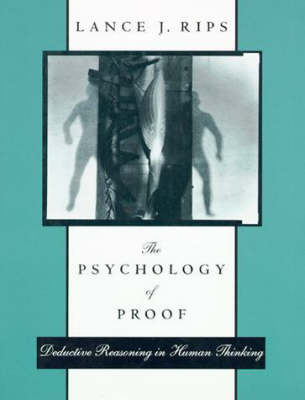
The Psychology of Proof
MIT Press (Verlag)
978-0-262-18153-2 (ISBN)
- Titel ist leider vergriffen;
keine Neuauflage - Artikel merken
A wide variety of original experiments support this model, including studies of human subjects evaluating logical arguments as well as following and remembering proofs. Unlike previous theories of mental proof, this one handles names and variables in a general way. This capability enables deduction to play a crucial role in other thought processes,such as classifying and problem solving.In part III Rips compares the theory to earlier approaches in psychology which confined the study of deduction to a small group of tasks, and examines whether the theory is too rational or too irrational in its mode of thought.Lance J. Rips is Professor of Psychology at Northwestern University.
Lance J. Rips is Professor of Psychology at Northwestern University.
Part 1 Preliminaries: psychological approaches to deduction - some examples of deductive reasoning, the centrality of deductive reasoning, main trends in reasoning research, conclusions and prospects; reasoning and logic - formal proof, the CPL (classical predicate logic) system, the place of logic in a theory of reasoning; reasoning and computation - problems of search in deduction, non-resolution methods and revisions to the, natural-deduction rules, solving problem by proving theorem. Part 2 A psychological theory of deduction: mental proofs and their formal properties - overview of the core theory, core assumptions, formal properties, appendix - proofs of the major propositions; mental proofs and their empirical consequences - some tests of the proof model, consistency with prior findings; variables in reasoning - extending the core system to variables, formal properties, appendix - proofs of the major propositions; reasoning with variables - empirical predictions for sentences with a single variable, predictions for multi-variable contexts, summary, appendix - syllogism results. Part 3 Implications and extensions: the role of deduction in thought - deduction as a cognitive architecture, frames, schemas, theories, and deduction, natural deduction, nonmonotonic logic, and truth maintenance, open questions; alternative psychological theories - rule-based systems - alternative theories based on natural deduction, pragmatic schemas, social contracts, summary; alternative psychological theories - ruleless systems - heuristic-based theories and "Content" effects, reasoning by diagrams and models, how plausible are mental diagrams and models as, explanations of reasoning?; perspectives on reasoning ability - aren't you making people out to be more logical or, rational than they really are?, aren't you making people out to be more illogical or, irrational than they really are?, summary.
| Erscheint lt. Verlag | 21.4.1994 |
|---|---|
| Reihe/Serie | Bradford Books |
| Zusatzinfo | 30 |
| Verlagsort | Cambridge, Mass. |
| Sprache | englisch |
| Maße | 157 x 231 mm |
| Gewicht | 862 g |
| Themenwelt | Geisteswissenschaften ► Psychologie ► Allgemeine Psychologie |
| Geisteswissenschaften ► Psychologie ► Verhaltenstherapie | |
| ISBN-10 | 0-262-18153-3 / 0262181533 |
| ISBN-13 | 978-0-262-18153-2 / 9780262181532 |
| Zustand | Neuware |
| Haben Sie eine Frage zum Produkt? |
aus dem Bereich


